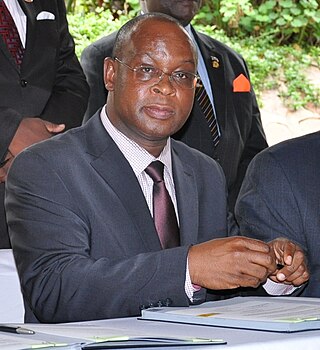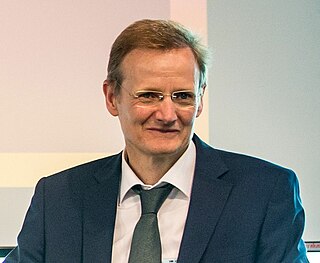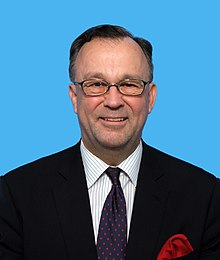The Austrian School is a heterodox school of economic thought that advocates strict adherence to methodological individualism, the concept that social phenomena result primarily from the motivations and actions of individuals and their self interest. Austrian school theorists hold that economic theory should be exclusively derived from basic principles of human action.

Carl Menger von Wolfensgrün was an Austrian economist and the founder of the Austrian School of economics. Menger contributed to the development of the theories of marginalism and marginal utility, which rejected cost-of-production theory of value, such as developed by the classical economists such as Adam Smith and David Ricardo. As a departure from such, he would go on to call his resultant perspective, the subjective theory of value.

Friedrich August von Hayek, often referred to by his initials F. A. Hayek, was an Austrian-British economist and political philosopher who made contributions to economics, political philosophy, psychology, intellectual history, and other fields. Hayek shared the 1974 Nobel Memorial Prize in Economic Sciences with Gunnar Myrdal for work on money and economic fluctuations, and the interdependence of economic, social and institutional phenomena. His account of how prices communicate information is widely regarded as an important contribution to economics that led to him receiving the prize.
Regional science is a field of the social sciences concerned with analytical approaches to problems that are specifically urban, rural, or regional. Topics in regional science include, but are not limited to location theory or spatial economics, location modeling, transportation, migration analysis, land use and urban development, interindustry analysis, environmental and ecological analysis, resource management, urban and regional policy analysis, geographical information systems, and spatial data analysis. In the broadest sense, any social science analysis that has a spatial dimension is embraced by regional scientists.
Development economics is a branch of economics that deals with economic aspects of the development process in low- and middle- income countries. Its focus is not only on methods of promoting economic development, economic growth and structural change but also on improving the potential for the mass of the population, for example, through health, education and workplace conditions, whether through public or private channels.
The historical school of economics was an approach to academic economics and to public administration that emerged in the 19th century in Germany, and held sway there until well into the 20th century. The professors involved compiled massive economic histories of Germany and Europe. Numerous Americans were their students. The school was opposed by theoretical economists. Prominent leaders included Gustav von Schmoller (1838–1917), and Max Weber (1864–1920) in Germany, and Joseph Schumpeter (1883–1950) in Austria and the United States.

Georg Friedrich List was a German-American economist and political theorist who developed the nationalist theory of political economy in both Europe and the United States. He was a forefather of the German historical school of economics and argued for the Zollverein from a nationalist standpoint. He advocated raising tariffs on imported goods while supporting free trade of domestic goods and stated the cost of a tariff should be seen as an investment in a nation's future productivity.

Werner Sombart was a German economist, historian and sociologist. Head of the "Youngest Historical School," he was one of the leading Continental European social scientists during the first quarter of the 20th century. The term late capitalism is accredited to him. The concept of creative destruction associated with capitalism is also of his coinage. His magnum opus was Der moderne Kapitalismus. It was published in 3 volumes from 1902 through 1927. In Kapitalismus he described four stages in the development of capitalism from its earliest iteration as it evolved out of feudalism, which he called proto-capitalism to early, high and, finally, late capitalism —Spätkapitalismus— in the post World War I period.
The Mont Pelerin Society (MPS) is a neoliberal international organization composed of economists, philosophers, historians, intellectuals and business leaders. The society advocates freedom of expression, free market economic policies and the political values of an open society. Further, the society seeks to discover ways in which the private sector can replace many functions currently provided by government entities. Some scholars deny that the Mont Pelerin Society is neoliberal and claim that it is classical liberal.

Fritz Machlup was an Austrian-American economist. He was president of the International Economic Association from 1971 to 1974. He was one of the first economists to examine knowledge as an economic resource, and is credited with popularising the concept of the information society.

Export-oriented industrialization (EOI), sometimes called export substitution industrialization (ESI), export-led industrialization (ELI), or export-led growth, is a trade and economic policy aiming to speed up the industrialization process of a country by exporting goods for which the nation has a comparative advantage. Export-led growth implies opening domestic markets to foreign competition in exchange for market access in other countries.

Economic integration is the unification of economic policies between different states, through the partial or full abolition of tariff and non-tariff restrictions on trade.

Maxwell Mkwezalamba is a Malawian politician and economist. He is currently First Alternate Executive Director for Africa Group 1 Constituency, comprising 23 African countries, at the International Monetary Fund in Washington, DC, USA. Before this appointment, he briefly served as Minister of Finance for Malawi under former President Dr. Joyce Banda, before Cabinet was dissolved prior to the May 20, 2014 Tripartite Elections. Between May 2004 and April 2013, he served as Commissioner for Economic Affairs for the African Union in Addis Ababa, Ethiopia. When President Peter Mutharika ascended to power in June 2014, the Finance portfolio was given to Goodall Gondwe.
In the history of economic thought, a school of economic thought is a group of economic thinkers who share or shared a common perspective on the way economies work. While economists do not always fit into particular schools, particularly in modern times, classifying economists into schools of thought is common. Economic thought may be roughly divided into three phases: premodern, early modern and modern. Systematic economic theory has been developed mainly since the beginning of what is termed the modern era.

Lúcio Vinhas de Souza is a Brazilian-Portuguese economist. His main research areas are global macroeconomics, development economics, monetary economics, finance and country risk, with extensive work experience at the developed economies of the European Union and the US, and in several emerging market regions, from the former Soviet Union to East Asia, Africa and Latin America.

Werner Hoyer is a German economist and politician of the Free Democratic Party (FDP) who served as President of the European Investment Bank (EIB) between 2012 and 2023.

Ludger Schuknecht is a German economist who has been serving as vice president and Corporate Secretary of the Asian Infrastructure Investment Bank since 2021.
Willy van Ryckeghem is a Belgian economist and statistician who devoted much of his career to Latin America. He studied economics in Ghent, Copenhagen and Paris and taught Business cycles at Vrije Universiteit Brussel and Econometrics at Ghent University from 1968 to 1982. He was also visiting Associate Professor at the University of North Carolina at Chapel Hill in 1963-64 and Visiting Professor at the Universiti Sains Malaysia in Penang in 1976.

Beata Smarzynska Javorcik is a Polish economist who is currently the Chief Economist at the European Bank for Reconstruction and Development (EBRD). She is the first woman to hold this position. She is also the first woman to hold a statutory professorship in economics at the University of Oxford. She is a former senior economist of the Development Economics Research Group at the World Bank, where she previously served as a Country Economist for Azerbaijan, Europe, and the Central Asia Region and was involved in research activities regarding lending operations and policy advice. She is also a program director of the International Trade and Regional Economics Programme at the Centre for Economic Policy Research in London. Her other affiliations include the Royal Economic Society in London, CESifo in Munich, International Growth Centre in London, and the Centre for Research on Globalization and Economic Policy at the University of Nottingham.
Saul Eslake is an Australian economist, commentator, and public speaker. "He has a knack for explaining economics in terms mere mortals can understand, which is why he's always in such high demand as a speaker and commentator." He is the principal of Corinna Economic Advisory, and previously was the Chief Economist at the Australia & New Zealand Banking Group between 1995 and 2009, and the Chief Economist for Bank of America Merrill Lynch between 2011 and 2015. He has been a Vice Chancellor's Fellow at the University of Tasmania since 2016.











